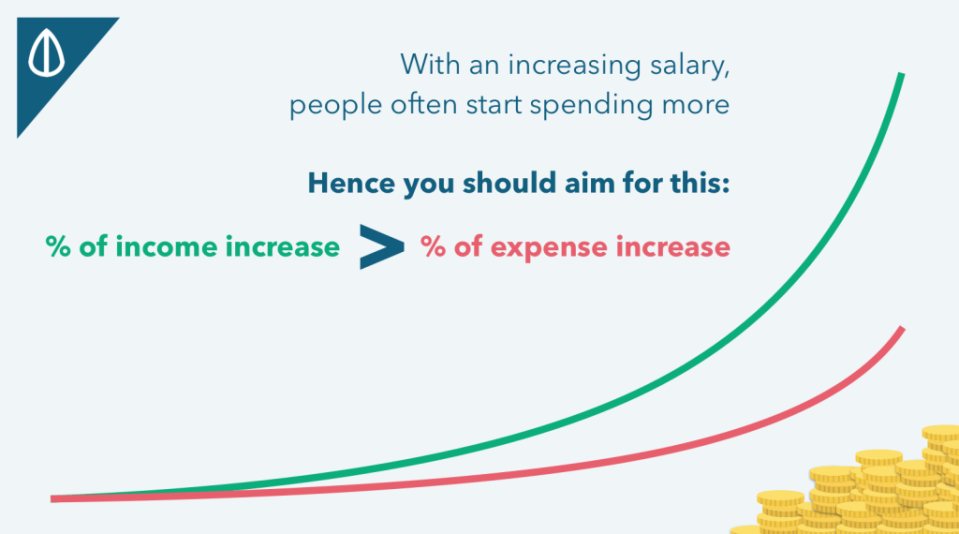Seedly: What Is A Good Pay In Singapore And How Much To Save
When you just started working, you would most likely be thinking: How much am I earning compared to the average Singaporean?
This article serves a simple guide and representation of the income distribution among Singaporeans in the world’s most expensive country with unique insights.
TL;DR: An average Singaporean earns $3,500
The Typical Singaporean Worker Median Monthly Salary is $3,500 (excluding employer CPF)
This amount increases by 3 – 5% every year across all ages
Local Fresh Graduates have a Median Gross starting salary is $3,360
What that indicates is that a Degree from a local University would bring you closest to the average Singaporean salary benchmark (if you work hard to get hired)
*Why we use Median: Because Income is often skewed by top earning individuals if we calculate averages (Find out more about the difference between Average and Medians here.)
The big salary divide

Disclaimer: This data was collated from Ministry of Manpower Singapore in addition to crowd-sourced data. Some users brought up that amid tougher economic conditions these numbers may vary accordingly.
Traditional lower paying jobs ($900 to $2,500)
Cleaners: $900 to $1,200 (Facilities, Malls, and Condominium roles)
Security Guards: $1,700 to $2,500 (Facilities, Malls, and Condominium security roles)
Taxi drivers: $2,000 to $3,000 (After deducting car rentals, similar to UBER and GRAB ad-hoc drivers)
Traditional mid-higher paying jobs ($3,000 to $6,000)
Bankers: Starting from $3,500 to $4,500 (tough hiring market, many resorting to contract jobs before full-time conversion)
Software Engineers: Starting from $4,000 to $4,800 (solid hiring market for many roles in both tech and non-tech firms)
Lawyers: Starting from $4,500 to $5,000 (tough hiring market to get training contracts)
Doctors: Starting from $6,000 (at government hospitals)
Editor’s note: Seedly missed out an income bracket between the high-skilled jobs and low-skilled jobs, which comprise a large percentage of our workforce too. Most of these jobs fall under the low-$2,000 and high-$2,000 range.
Extreme high-end jobs ($10,000 to $15,000 & beyond)
Entrepreneurs, own bosses: Above $10,000 to $15,000 (Usually passed down from family businesses, or larger tech start-ups, but with higher failure rate)
Senior Management and C-suite in MNCs: Salary above $15,000 (Our Government Ministers actually peg their salaries to this group. Usually come also with huge bonuses and directors fees)
What does this all mean – Increase % of income growth
To fresh graduates reading this, you need to understand that the economy is always in a stage of change. In addition to this, the median Singaporean incomes will always increase at a rate of 3-5% a year, and you will need to keep up or BEAT that rate.
Out of college, it is the best time to apply your knowledge. However, what you studied in your previous 4 – 5 years as an undergraduate may not apply to the real world. Soon after working as a management trainee or entry level role for some years, you may need to reflect and find out if you are going to start your own company or climb the corporate ladder to a senior management position if you want to break into the next income bracket.

Riding with the ever-changing conditions:
Depressed hiring economic climate
Technological change is rapid, affecting all industries to large extents
Globalization and transfer of talent (in/out of Singapore)
Every year, there will be an article in The Straits Times/TODAY during graduation season to show you how tough the market is. The good ones will survive and be nimble, whereas the bad ones will just complain about everything (*cough, the above 3 points)
Conclusion: The importance of a Growth Mindset
If you have a job, look to grow and build your network relationships. Don’t sit around and think that you are safe because no one is really safe in this economic climate.
“Your network is your net worth”
If you have not found a job, keep looking and be focused. I believe if you craft really clear resumes and cover letters on why Job X is the best fit for you. As an employer ourselves hiring, we see many half-hearted attempts and generic resumes. Make yourself so good that the employers have no reason to ignore you. Nothing good comes easy in life.
Ultimately, your mindset and attitude is something that no one can take away from you. Sit and reflect often to see what you want to learn in the next phase of your life adventure. The salary is merely a benchmark of your value to society, so keep going forward and upward – be valuable to society.

 Yahoo Finance
Yahoo Finance 
